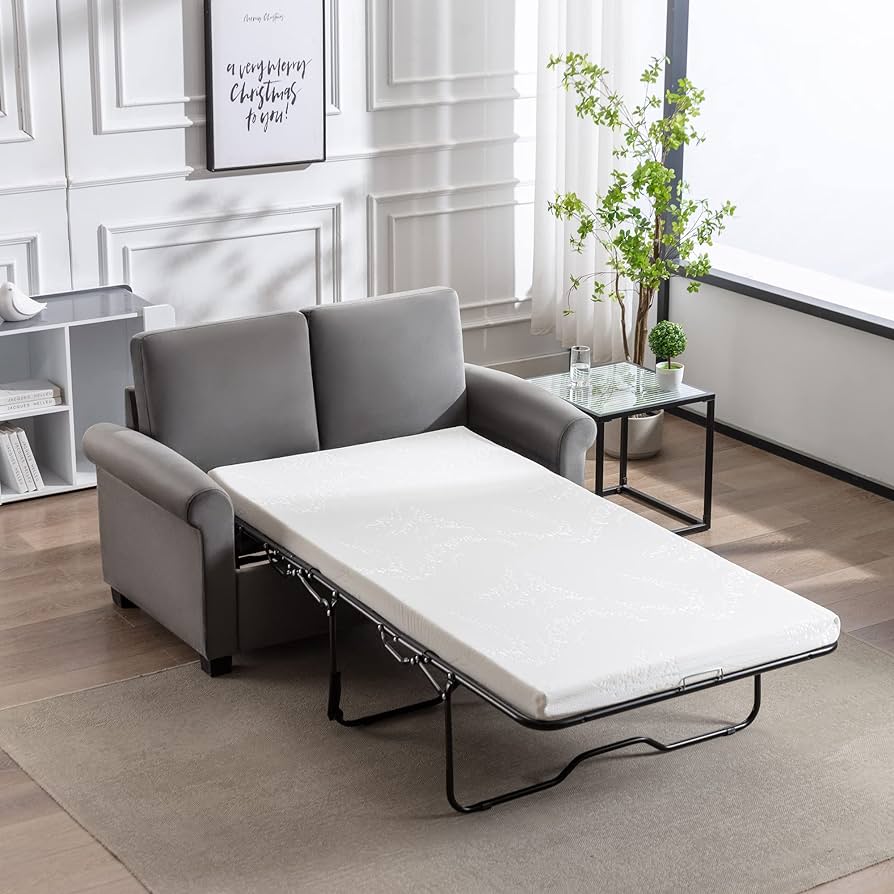A sofa typically weighs between 70 to 200 pounds. Adding both comfort and style to any living space, sofas are an essential piece of furniture that anchors the room.
However, when it comes to moving or rearranging the furniture, it’s important to consider the weight of a sofa. The weight of a sofa can vary depending on the size, type, and materials used. On average, a standard sofa can weigh anywhere from 70 to 200 pounds.
The weight of a sofa is an important factor to consider, especially when planning for delivery, moving, or placing the sofa in an upper-floor apartment. Understanding the weight of a sofa can help ensure a smooth and hassle-free experience when it comes to handling and arranging furniture.
Table of Contents
Factors Affecting Sofa Weight
When it comes to choosing the perfect sofa for your living space, weight may not be the first thing that comes to mind. However, it’s important to consider the weight of a sofa, as it can affect its overall stability, portability, and even the difficulty of moving it around your home. Several factors contribute to the weight of a sofa, including the material and construction, size and dimensions, as well as the upholstery and cushioning.
Material And Construction
The material and construction of a sofa play a significant role in determining its weight. Sofas are commonly made from a variety of materials such as wood, metal, or a combination of both. For instance, a sofa with a wooden frame tends to be heavier compared to those with a metal frame. Additionally, the type and density of the foam used in the cushions also contribute to the overall weight. High-density foam, while providing excellent support and durability, tends to be heavier than low-density foam. Moreover, the presence of additional structural elements like built-in storage or reclining mechanisms can add to the weight as well.
Size And Dimensions
The size and dimensions of a sofa are directly proportional to its weight. The larger the sofa, the heavier it tends to be. Sofas with longer or deeper seats, wider armrests, or higher backs typically require more materials to construct, resulting in increased weight. In addition, the depth and thickness of the cushions also contribute to the weight. A sofa with thicker, plush cushions will generally be heavier compared to one with thinner cushions.
Upholstery And Cushioning
The choice of upholstery material and cushioning can significantly impact the weight of a sofa. Upholstery materials such as leather or velvet tend to be heavier than fabrics like cotton or linen. Furthermore, additional features like tufting or decorative details can add to the weight. The type of cushioning used, such as down-filled or memory foam, can also affect the weight. While these materials provide added comfort, they are typically denser and heavier compared to standard foam cushions.
In conclusion, several factors contribute to the weight of a sofa, including the material and construction, size and dimensions, as well as the upholstery and cushioning. When choosing a sofa, it’s important to consider these factors alongside your personal preferences and the specific requirements of your living space. By understanding the various elements that affect sofa weight, you can make an informed decision that meets both your style and practical needs.
Understanding Material And Construction
Understanding the material and construction of a sofa is crucial when it comes to determining its weight. Various factors such as the frame materials and cushion fillings play a significant role in the overall weight of a sofa. In this section, we will delve into the different types of frame materials, the impact they have on the weight of a sofa, as well as the various types of cushion fillings and their weight.
Different Types Of Frame Materials
Sofa frames can be made from a variety of materials, each with its own weight characteristics. Here are some of the most common types of frame materials:
| Frame Material | Weight Characteristics |
|---|---|
| Wood | Wooden frames tend to be relatively heavy, especially if made from solid hardwood. |
| Metal | Metal frames, such as those made from steel or iron, are generally heavier compared to other materials. |
| Particle Board | Particle board frames are typically lighter in weight but may not be as sturdy as other materials. |
| Plastic | Plastic frames are lightweight and are often used in more affordable or portable sofas. |
Impact Of Frame Material On Sofa Weight
The choice of frame material can significantly impact the weight of a sofa. Heavier frame materials, such as solid wood or metal, tend to result in a heavier overall weight for the sofa. On the other hand, lighter frame materials like particle board or plastic can reduce the overall weight of the sofa. It’s important to consider the desired level of durability and comfort when selecting the frame material, as it can influence not only the weight but also the longevity of the sofa.
Types Of Cushion Fillings And Their Weight
In addition to the frame material, the cushion fillings also contribute to the overall weight of a sofa. The type of cushion filling used can vary and each has its own weight characteristics. Here are a few common types of cushion fillings:
- Foam: Foam cushions are generally lightweight, making them a popular choice.
- Down and Feather: Down and feather cushions tend to be heavier due to their natural fillings.
- Polyester Fiber: Polyester fiber cushions are lightweight and offer a good balance of comfort and support.
By considering the weight of different cushion fillings, you can choose the most suitable option based on your preferences and needs.
The Impact Of Size And Dimensions
When it comes to furniture, size matters. The same applies to sofas, as their weight is largely influenced by their size and dimensions. Understanding this relationship is essential, especially if you are planning on moving or rearranging your living room. In this article, we will delve into the various factors that affect the weight of a sofa and explore how size and dimensions play a significant role.
Relationship Between Sofa Size And Weight
The weight of a sofa is directly proportional to its size. As the dimensions of a sofa increase, so does its weight. To put it simply, the bigger the sofa, the heavier it will be. This correlation is mainly due to the materials used in its construction. Larger sofas typically require more wood, metal, and foam, resulting in increased weight.
Factors To Consider: Length, Width, And Height
When determining the weight of a sofa, it is crucial to consider its length, width, and height. These dimensions provide valuable insights into the overall volume and bulkiness of the piece. Let’s break it down:
| Dimensions | Impact on Weight |
|---|---|
| Length | A longer sofa will likely weigh more compared to a shorter one, mainly due to the additional materials required to support the extended length. |
| Width | Similar to the length, a wider sofa will generally be heavier. The extra width necessitates an increase in materials, contributing to the overall weight. |
| Height | The height of a sofa typically has a minimal impact on its weight, as it mainly affects the overall aesthetic and comfort rather than the structural components. |
Differences In Weight Across Sofa Styles (sectional, Sleeper, Reclining, Etc.)
Aside from size and dimensions, the style of the sofa also plays a role in determining its weight. Various types of sofas, such as sectionals, sleepers, and recliners, have distinct features that can influence their weight:
- Sectional Sofas: Sectionals consist of multiple connected pieces, usually with a chaise or ottoman. Due to the additional components, sectional sofas tend to be heavier compared to regular sofas.
- Sleeper Sofas: Sleeper sofas have a hidden bed mechanism, which adds weight to the overall structure. The inclusion of metal frames and mechanisms makes them heavier than standard sofas.
- Reclining Sofas: Reclining sofas are equipped with mechanical mechanisms for adjusting the backrest and footrest. This mechanism adds extra weight to the sofa, making it heavier than non-reclining options.
These are just a few examples of how different sofa styles can affect their weight. It’s essential to consider not only the dimensions but also the specific features of the sofa you are interested in.
The Role Of Upholstery And Cushioning
When it comes to selecting a sofa for your living room, there are several factors to consider. One important aspect is the weight of the sofa, as it can affect its portability, delivery costs, and ease of rearranging your furniture. The weight of a sofa can vary depending on different factors, and two significant contributors to the overall weight are upholstery and cushioning.
Weighing The Pros And Cons Of Different Upholstery Materials
The type of upholstery material used on a sofa plays a crucial role in determining its weight. Various materials have different properties, pros, and cons. Let’s take a closer look at some common upholstery materials:
| Upholstery Material | Pros | Cons |
|---|---|---|
| Fabric | Fabric sofas are generally lightweight and easy to move. They offer a wide range of color and pattern options to suit any decor. Fabric is also soft to touch, providing a comfortable seating experience. | Some fabrics may stain or fade over time, requiring regular maintenance and cleaning. They may not be as durable as some other materials. |
| Leather | Leather sofas are known for their luxury and durability. They can withstand wear and tear, making them a popular choice for families with children or pets. Leather also ages gracefully, developing a beautiful patina over time. | Leather sofas tend to be heavier due to the density of the material. They require proper care to prevent drying or cracking, and they can be more expensive compared to other options. |
| Polyurethane (PU) Leather | PU leather is a synthetic material that offers a similar look and feel to genuine leather at a lower cost. It is generally lighter in weight compared to real leather. | PU leather may not have the same durability as genuine leather, and it may not age as gracefully. It can also be less breathable, resulting in a slightly less comfortable seating experience. |
How Different Cushioning Types Affect Weight
In addition to upholstery, the type of cushioning used in a sofa also contributes to its overall weight. Cushions are designed to provide comfort and support, but they can vary in weight depending on the materials used. Here are some common cushioning types and their impact on weight:
- Foam Cushions: Foam cushions are lightweight and offer excellent support. They are often used in modern sofas for their resilience and durability. However, they can become compacted over time, leading to a less comfortable seating experience.
- Down Feather Cushions: Down feathers provide a luxurious and soft seating experience. They are lightweight and easily fluffed to maintain their shape. However, they may require occasional plumping to prevent flattening and can be more expensive.
- Spring Cushions: Sofas with spring cushions have a network of metal springs beneath the upholstery. While they offer excellent support and help maintain the shape of the sofa, they can increase its weight due to the metal framework.
The Influence Of Upholstery Accessories On Sofa Weight
When considering the weight of a sofa, it’s important to take into account any additional accessories or embellishments attached to the upholstery. These accessories can include decorative buttons, trimmings, or metal accents that contribute to the overall weight of the sofa. While they may enhance the aesthetics, they can also add to the bulk of the furniture.
In conclusion, the weight of a sofa is influenced by various factors, with upholstery and cushioning playing a significant role. Knowing the pros and cons of different upholstery materials, cushioning types, and upholstery accessories can help you make an informed decision when choosing a sofa that fits your needs and preferences.
Measuring And Calculating Sofa Weight
Measuring the weight of a sofa is essential when moving, purchasing, or determining if it is suitable for specific floors or structures. Knowing the weight can help you make informed decisions and prevent potential accidents or damage. This section will provide you with valuable tips, tools, and average weights of sofas based on their type and material.
Tips For Accurately Measuring Sofa Weight
- Ensure the sofa is empty of any additional items like cushions, throws, or storage compartments before measuring.
- Use a reliable weight measuring scale that can handle the weight capacity of the sofa.
- Measure the weight on a hard and level surface to obtain accurate results.
- For larger sofas, it might be necessary to disassemble them to measure individual parts or use a platform scale.
Tools And Methods To Calculate Sofa Weight At Home
Calculating the weight of your sofa at home is relatively straightforward. You will need:
- A bathroom scale or luggage scale with sufficient weight capacity.
- Assistance from a friend or family member to help lift and stabilize the sofa during the weighing process.
- A sturdy and level surface to place the scale and the sofa.
Here’s a simple method to calculate sofa weight using a scale:
- Carefully lift one end of the sofa and place the scale evenly beneath that end.
- Next, lift the other end of the sofa and position it on the scale, ensuring both ends are evenly supported.
- Make sure the scale displays the weight correctly and note it down.
- Repeat the process if your sofa has sectional parts, noting down the weight of each section separately.
- Add up the individual weights to get the total weight of your sofa.
Average Sofa Weights By Type And Material
Sofa weights may vary depending on their type and the materials used. Here is a rough estimation of average sofa weights based on different types and materials:
| Type | Average Weight |
|---|---|
| Modern Sofa (2-seater) | 150-250 pounds |
| Sectional Sofa | 250-450 pounds |
| Sleeper Sofa | 200-350 pounds |
| Leather Sofa | 200-400 pounds |
Please note that these weights are approximate and may vary depending on the specific design, size, and construction of the sofa.

Credit: www.nytimes.com
Frequently Asked Questions On How Much Does A Sofa Weigh
How Much Does Your Average Sofa Weigh?
The average weight of a sofa is around 100-200 pounds.
How Heavy Is A Small Sofa?
A small sofa weighs around 50-100 pounds. It is light enough to be easily moved and rearranged in your living space.
How Heavy Is A 3-seater Leather Sofa?
A 3-seater leather sofa typically weighs around 150 to 250 pounds.
How Much Does A Sofa Weigh Kg?
A standard sofa typically weighs around 30-40 kilograms.
Conclusion
Understanding the weight of a sofa is crucial for several reasons, including logistics, safety concerns, and even the type of flooring it will be placed on. By considering the materials used, the size, and any additional features, you can determine an estimate of how much a sofa weighs.
Whether you’re moving, setting up a new space, or simply curious, knowing the weight of a sofa can help you make informed decisions. Take into account the information provided, and remember to measure and consider the weight capacity of your sofas.



